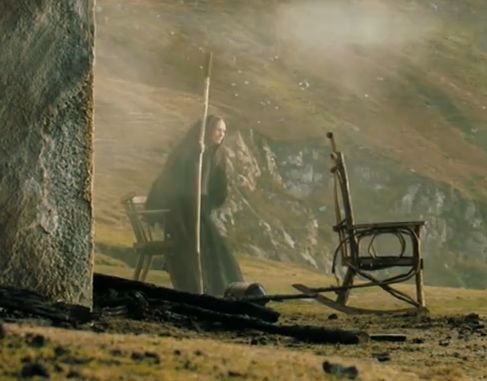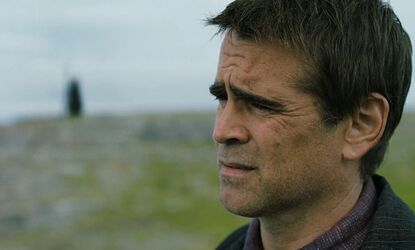Now you got me digging through the movie! :D
And you are correct, the lady at the lake is Mrs. McCormick. I just didn’t recognize her from the previous scenes.
We think she’s beckoning Siobhán (the sister) but actually it’s Dominic, who is not sneaking, but sidling up behind her.
The sister calls her a ghoul and Dominic says he always calls her a ghoul too, because she is a ghoul. And that’s his argument for why he and Siobhán have so much in common. “Calling old people ghouls and that.”.
You know who else might be called ghouls? Banshees.
So I guess that means I think the blurry figure on the cliffs is Mrs McCormick. But I could give you that one, because it could just as well have been Colm, or Odin, or Bigfoot.
But now that I’m looking at it, they do seem to be holding a staff. Just like Mrs. McCormick in the scene where she sits down in front of Colms smoldering house:

I also base my interpretation on the reaction of the sister.
She’s smiling and waving to Padraic from the boat. Her smile disappears and her face turns grave as she sees the figure. There’s a shot of her looking at the figure, then over at Padraic.
Yes, but Colm tells Padraic about the banshees, and how they don’t scream anymore.
Here’s the conversation:
P: What’s it called?
C: The Banshees of Inisherin, I was thinking.
P: But there are no banshees on Inisherin.
C: I know, I just love the double S-H sounds.
P: Aye. There’s plenty of double S-H on Inisherin.
C: Yeah, maybe there are banshees too. I just don’t think they scream to portend death anymore. I think they just sit back, amused, and observe.
P: Portend?
C: Yeah. I keep having thoughts about playing it for you at your funeral. But that wouldn’t be fair on either of us, would it?
P: Well, that’s great that you finished your tune, Colm.
Skimming through the movie just now, I also realize that Mrs. McCormick is in the village shop, observing the conversation between Padraic and the shopkeeper, when the shopkeeper chastizes him for “never havin’ a lick of news from his side of the island”.
Paedar the policeman comes in, and tells of a man who walked into a lake. “29 and nothing wrong with him, the fool!”.
Mrs. McCormick never says a word, she just sits there smoking her pipe.


